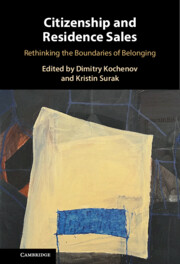100 results
Restoring Dialogical Rule of Law in the European Union: Janus in the Mirror
-
- Journal:
- Cambridge Yearbook of European Legal Studies , First View
- Published online by Cambridge University Press:
- 02 April 2024, pp. 1-16
-
- Article
-
- You have access
- Open access
- HTML
- Export citation
Preface by Atossa Araxia Abrahamian
-
- Book:
- Citizenship and Residence Sales
- Published online:
- 06 April 2023
- Print publication:
- 13 April 2023, pp xvii-xviii
-
- Chapter
- Export citation
Tables
-
- Book:
- Citizenship and Residence Sales
- Published online:
- 06 April 2023
- Print publication:
- 13 April 2023, pp xi-xi
-
- Chapter
- Export citation
Contributors
-
- Book:
- Citizenship and Residence Sales
- Published online:
- 06 April 2023
- Print publication:
- 13 April 2023, pp xii-xiii
-
- Chapter
- Export citation
Table of Cases
-
- Book:
- Citizenship and Residence Sales
- Published online:
- 06 April 2023
- Print publication:
- 13 April 2023, pp xix-xxi
-
- Chapter
- Export citation
Copyright page
-
- Book:
- Citizenship and Residence Sales
- Published online:
- 06 April 2023
- Print publication:
- 13 April 2023, pp iv-iv
-
- Chapter
- Export citation
Figures
-
- Book:
- Citizenship and Residence Sales
- Published online:
- 06 April 2023
- Print publication:
- 13 April 2023, pp x-x
-
- Chapter
- Export citation
Avant-propos
-
- Book:
- Citizenship and Residence Sales
- Published online:
- 06 April 2023
- Print publication:
- 13 April 2023, pp xiv-xvi
-
- Chapter
- Export citation
Index
-
- Book:
- Citizenship and Residence Sales
- Published online:
- 06 April 2023
- Print publication:
- 13 April 2023, pp 535-560
-
- Chapter
- Export citation
Part II - Explanations and Contextualizations
-
- Book:
- Citizenship and Residence Sales
- Published online:
- 06 April 2023
- Print publication:
- 13 April 2023, pp 207-374
-
- Chapter
- Export citation
Dedication
-
- Book:
- Citizenship and Residence Sales
- Published online:
- 06 April 2023
- Print publication:
- 13 April 2023, pp v-vi
-
- Chapter
- Export citation
Part I - Mapping Investment Migration Law and Practice
-
- Book:
- Citizenship and Residence Sales
- Published online:
- 06 April 2023
- Print publication:
- 13 April 2023, pp 23-206
-
- Chapter
- Export citation
Abbreviations
-
- Book:
- Citizenship and Residence Sales
- Published online:
- 06 April 2023
- Print publication:
- 13 April 2023, pp xxii-xxiv
-
- Chapter
- Export citation
Introduction
-
-
- Book:
- Citizenship and Residence Sales
- Published online:
- 06 April 2023
- Print publication:
- 13 April 2023, pp 1-22
-
- Chapter
- Export citation
2 - Victims of Citizenship
- from Part I - Mapping Investment Migration Law and Practice
-
-
- Book:
- Citizenship and Residence Sales
- Published online:
- 06 April 2023
- Print publication:
- 13 April 2023, pp 70-108
-
- Chapter
- Export citation
Contents
-
- Book:
- Citizenship and Residence Sales
- Published online:
- 06 April 2023
- Print publication:
- 13 April 2023, pp vii-ix
-
- Chapter
- Export citation
Part III - Case Studies and Implications
-
- Book:
- Citizenship and Residence Sales
- Published online:
- 06 April 2023
- Print publication:
- 13 April 2023, pp 375-534
-
- Chapter
- Export citation

Citizenship and Residence Sales
- Rethinking the Boundaries of Belonging
-
- Published online:
- 06 April 2023
- Print publication:
- 13 April 2023
7 - The Loss of Face for Everyone Concerned
- from Part II - Resilience at the European Level
-
-
- Book:
- Migrants' Rights, Populism and Legal Resilience in Europe
- Published online:
- 19 May 2022
- Print publication:
- 02 June 2022, pp 187-208
-
- Chapter
-
- You have access
- Open access
- HTML
- Export citation
Chapter 13 - Constitutional Populism versus EU Law: A Much More Complex Story than You Imagined
- from IV - Eu Responses
-
-
- Book:
- Anti-Constitutional Populism
- Published online:
- 24 March 2022
- Print publication:
- 31 March 2022, pp 462-492
-
- Chapter
- Export citation

